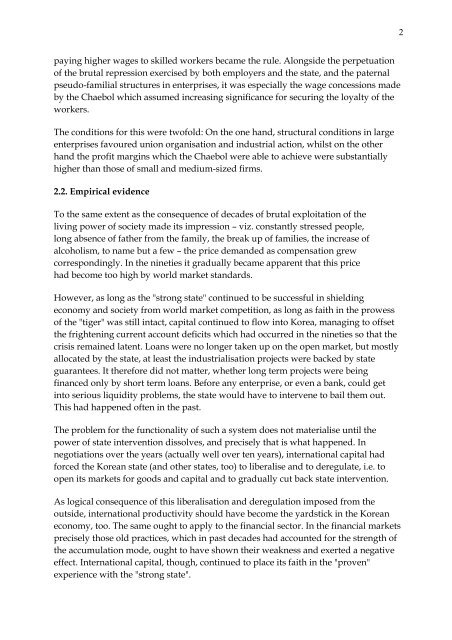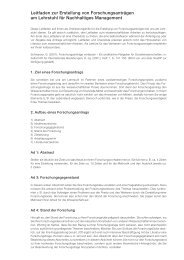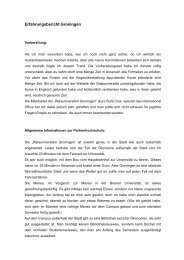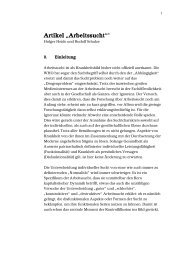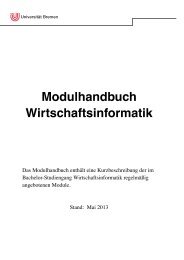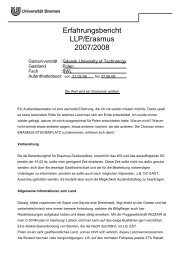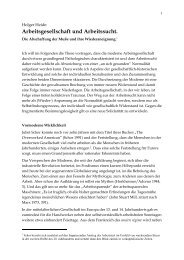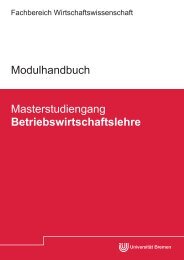Holger Heide Schumpeterian Dynamics in Crisis - Universität Bremen
Holger Heide Schumpeterian Dynamics in Crisis - Universität Bremen
Holger Heide Schumpeterian Dynamics in Crisis - Universität Bremen
Create successful ePaper yourself
Turn your PDF publications into a flip-book with our unique Google optimized e-Paper software.
2<br />
pay<strong>in</strong>g higher wages to skilled workers became the rule. Alongside the perpetuation<br />
of the brutal repression exercised by both employers and the state, and the paternal<br />
pseudo-familial structures <strong>in</strong> enterprises, it was especially the wage concessions made<br />
by the Chaebol which assumed <strong>in</strong>creas<strong>in</strong>g significance for secur<strong>in</strong>g the loyalty of the<br />
workers.<br />
The conditions for this were twofold: On the one hand, structural conditions <strong>in</strong> large<br />
enterprises favoured union organisation and <strong>in</strong>dustrial action, whilst on the other<br />
hand the profit marg<strong>in</strong>s which the Chaebol were able to achieve were substantially<br />
higher than those of small and medium-sized firms.<br />
2.2. Empirical evidence<br />
To the same extent as the consequence of decades of brutal exploitation of the<br />
liv<strong>in</strong>g power of society made its impression – viz. constantly stressed people,<br />
long absence of father from the family, the break up of families, the <strong>in</strong>crease of<br />
alcoholism, to name but a few – the price demanded as compensation grew<br />
correspond<strong>in</strong>gly. In the n<strong>in</strong>eties it gradually became apparent that this price<br />
had become too high by world market standards.<br />
However, as long as the "strong state" cont<strong>in</strong>ued to be successful <strong>in</strong> shield<strong>in</strong>g<br />
economy and society from world market competition, as long as faith <strong>in</strong> the prowess<br />
of the "tiger" was still <strong>in</strong>tact, capital cont<strong>in</strong>ued to flow <strong>in</strong>to Korea, manag<strong>in</strong>g to offset<br />
the frighten<strong>in</strong>g current account deficits which had occurred <strong>in</strong> the n<strong>in</strong>eties so that the<br />
crisis rema<strong>in</strong>ed latent. Loans were no longer taken up on the open market, but mostly<br />
allocated by the state, at least the <strong>in</strong>dustrialisation projects were backed by state<br />
guarantees. It therefore did not matter, whether long term projects were be<strong>in</strong>g<br />
f<strong>in</strong>anced only by short term loans. Before any enterprise, or even a bank, could get<br />
<strong>in</strong>to serious liquidity problems, the state would have to <strong>in</strong>tervene to bail them out.<br />
This had happened often <strong>in</strong> the past.<br />
The problem for the functionality of such a system does not materialise until the<br />
power of state <strong>in</strong>tervention dissolves, and precisely that is what happened. In<br />
negotiations over the years (actually well over ten years), <strong>in</strong>ternational capital had<br />
forced the Korean state (and other states, too) to liberalise and to deregulate, i.e. to<br />
open its markets for goods and capital and to gradually cut back state <strong>in</strong>tervention.<br />
As logical consequence of this liberalisation and deregulation imposed from the<br />
outside, <strong>in</strong>ternational productivity should have become the yardstick <strong>in</strong> the Korean<br />
economy, too. The same ought to apply to the f<strong>in</strong>ancial sector. In the f<strong>in</strong>ancial markets<br />
precisely those old practices, which <strong>in</strong> past decades had accounted for the strength of<br />
the accumulation mode, ought to have shown their weakness and exerted a negative<br />
effect. International capital, though, cont<strong>in</strong>ued to place its faith <strong>in</strong> the "proven"<br />
experience with the "strong state".


